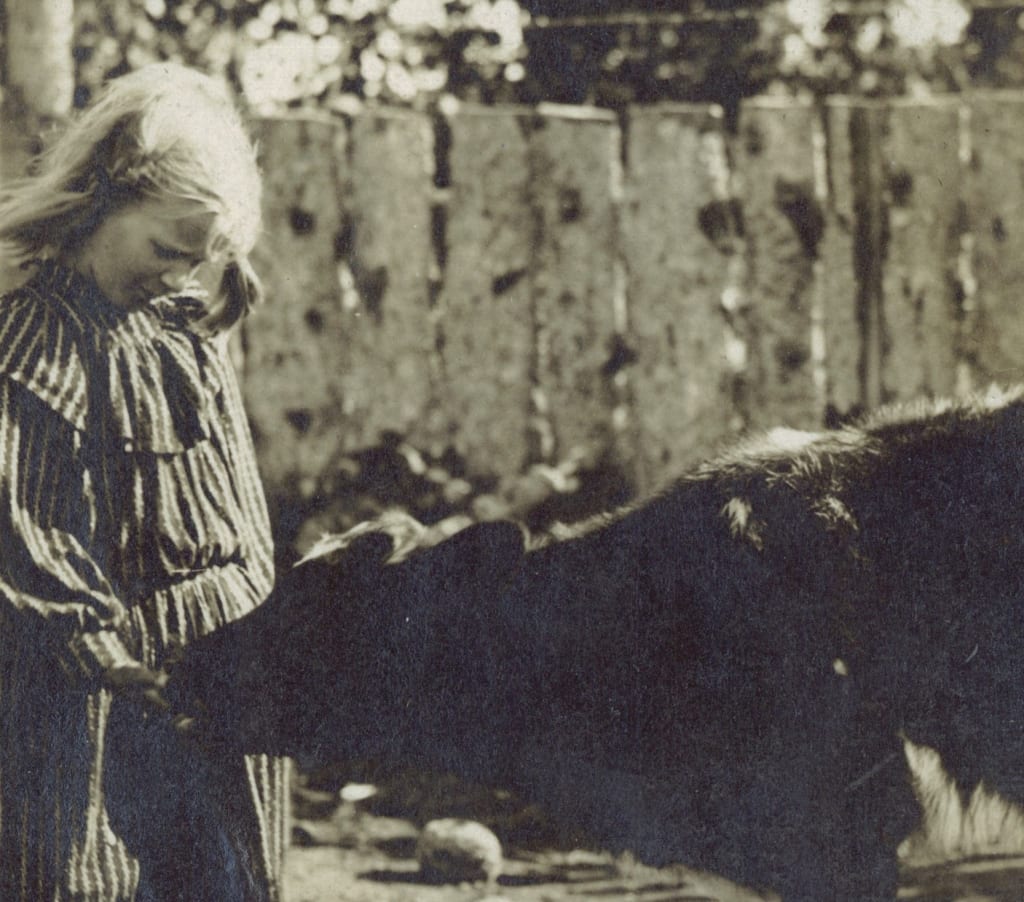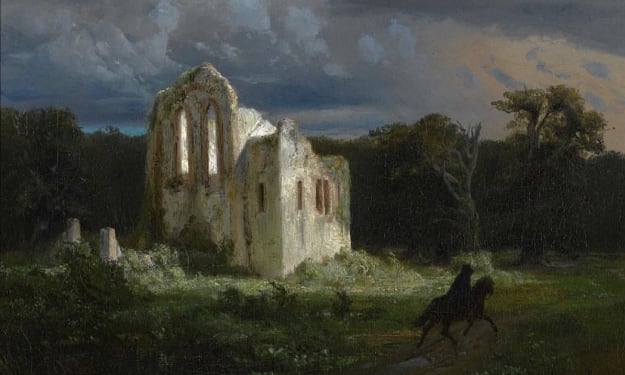Only
A "Golden Summer" Challenge Entry

Just three days out from San Antonio, the then-unnamed purple fever had claimed most of the livestock, and the stench had gotten so strong that a dark storm-cloud of mosquitos and flies followed along behind the train from the Louisiana line onward. The conductor pulled the brakes in a flat marshy clearing between Crowley and Lafayette and, under a starless sky, the train crew shoved three hundred and thirty nine corpses from the cattle cars onto either side of the tracks. It took over six hours. By the time they pulled into Baton Rouge, the remaining dozen cows had all perished too, save for one bony, shivering calf, who they named “Only” and sold to my Grandma for a nickel.
When I learned of “The Great 1875 Cattle Dump” many years later, Only had grown into a hefty, gentle “freemartin,” as they called her— calf-less with no intention of breeding. She had bristly gray fur with hazy streaks of lavender, a side-effect of the mysterious fever. She had a pep and a vigor unusual for a cow; more active than any of the other animals, trotting around the property sniffing honeysuckles and gazing out beyond the limits of the barb-wire, while pigs, ducks, dogs, and horses crowded together in the thin shade of the silo. She outlived generations of livestock, and my Grandma, too. There were times I thought she might outstay even me.
Only knew all my secrets. I whispered them into her ear on windless afternoons, so they wouldn’t blow away to undeserving ears. She knew that it was me who broke the bookshelf over Grandma’s bed, not the cats; she knew that I crossed my fingers in confession; that I sometimes ventured out at night to pray to the moon; that I shoplifted a chocolate bar from the General Store (she remembered this especially well, since I lent her half).
When thunderstorms would tumble through town at night, which was often in Louisiana, I would dash across the lawn with a lantern in hand, make a wet and frantic crawl through the stable—hay sticking to my soaked skin—before finally landing in a huddle against Only’s warm belly, which gently rose and fell as she snored.
Sometimes I gave us charcoal makeovers, and made matching flower crowns, and together we were the Queens of Belltower County. Other times we were patch-eyed, ruthless pirates, pacing around the deck of a sloop outlined in rocks in the dry grass. She was my first mate, my trusted steed, my Sancho Panza, my sister and my best friend.
“Do you think she remembers it?” I asked one morning, with the sun in my eyes, while Only munched on a sunflower and Grandma jarred jam on the porch.
“Of course she does,” Grandma said, though I knew her answer before it left her lips, the lips of a woman who remembered the Timber Mill fires while still resting in the womb. “You don’t forget something like that.”
“There’s no way to know, though,” I said. “Right?”
Grandma shrugged. “You could take her down there.”
“Down where?”
“To the tracks.”
“Is it close?”
She nodded, licked rhubarb spread from her knuckle. “Just past the lookout tower, along the split rail fence for about two miles.”
“Are there bodies?” I said.
“Not so much bodies now,” she said. “Bones I’m sure.”
Only happened to look over at that moment, jaw oscillating as she nibbled on a leaf.
“If you go now, you could be back before dinner,” she said.
So we did. Only kept a leisurely but even pace up the dirt road, softly tugging me towards the magnolia shade whenever I strayed. Her bell clanged and her tail swatted at flies. I whistled a song I had heard in church, but whose name I didn’t know.
We passed two men standing next to a steaming automobile, fanning themselves with their hats while a big cube of ice melted in the front seat. Another man was selling holy water in leather pouches for ten cents, which I bought and drank as soon as we were out of his sight, and drizzled the rest on Only’s forehead. We puzzled over a pair of two-tone shoes tied around the top branch of a lemon tree. By the time we passed the old lookout tower, the sun was directly overhead and our shadows were soft gray puddles beneath us.
I thought about Only’s memory, whether she would remember her calfhood over three decades ago. I myself had forgotten all of my six years of life prior to the farm—my mother’s face, the sound of her voice, the city, the sky, tuberculosis, the trolleycar crash that flung me here. A photograph of me and my parents on the grounds of a Philadelphia carnival in the winter—my hair tangled in a bow, them dressed in their Sunday best, shallow focus drowning out their faces in a pool of grain—may as well have been from another life.
And yet there was a scar on my arm, crawling up my elbow like pink ivy. And I had my mother’s nose, which, according to Grandma, wrinkled just like hers when I laughed. What I had forgotten, my body somehow remembered.
I brushed Only’s purple-streaked fur and continued along the split-rail fence. The further from town, and the closer to the tracks we got, the more nervous I grew, for a place of so much death and heartbreak must surely be haunted. I had never been to a forsaken place before, unless you counted church, which was the oldest building in Belltower and creaked at strange times. I was unsure how the souls of three hundred and thirty nine dead cows would manifest themselves in an overgrown marsh by an abandoned train track. Would we see their moving shapes in the corner of our eyes, just to turn and see nothing? Would we hear sad, strained moos on the wind? Would we smell the lingering stench of filth and disease?
But before we even saw the tracks, I felt it. A dread, like a fishing line hooked onto my heart and slowly dragged it down to my gut. Only dug her hooves into the dirt, and I tugged hard on her reins. She let out a quivering moan, and I rubbed the side of her head and whispered gently. Finally she relented and started moving again, and we rounded a large cypress tree and it all came into view.
The tracks were consumed with a bright orange fog, which stretched out onto the horizon, shifting and swaying in the breeze. A large gust sent a small puff of yellow dust whirling toward us. I covered my nose with my shirt and wiped the specks from my glasses, then put Only’s reigns in my teeth and plucked up a small flame-colored flower at my feet.
The railway had become a field of Marigolds, and beneath their bobbing pedals lay sun-bleached ribcages and horns, some of which jutted up from under the surface. It was impossible to shake the spectacle of the whole thing— a mass grave enveloped with millions of flowers, like the universe laid out a great cosmic bouquet in mourning.
The wind blew again, whistling through the bones with the sound of reed pipes, and another swarm of pollen flew at us. I ducked and turned away, catching a glance at Only. She was bracing the gale, nostrils shimmering and yellowed tears streaming sideways out of her eyes. Was it an allergic reaction? Or recognition?
“You okay, girl?” I said.
She bowed her head and nestled it against my armpit.
“You okay?”
Then she bent over and snapped a Marigold from the earth with her mouth, held it between her teeth for a moment, and proceeded to chew it. I laughed, because cows are funny when they eat, and because it confirmed something. Or, at least, I thought it did. But the following week, on my knees, with a communion wafer melting on my tongue, I understood.
I was twenty-one when Only laid down in the lettuce patch and quietly passed. I felt the first chill of Fall in the air—felt it sting my tear-streaked cheeks—as I buried her behind the tornado shelter. That winter I holed up in Grandma’s farmhouse, alone for the first time.
When spring came, Only’s grave yielded Marigolds. I plucked a few and laid them under Grandma’s tombstone in Belltower Cemetery. Then I plucked another and strained its pedals into a tea, and drank it with honey while I watched the sunset.





Comments
There are no comments for this story
Be the first to respond and start the conversation.